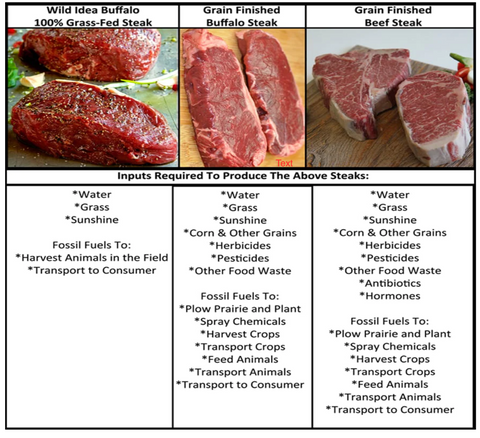Meat With a Side of Cortisol
Written by Arden Sperry
Our Food Supply
More than 90% of cattle and buffalo in the U.S. are sent to feedlots and slaughterhouses. The process of shipping and inhumanely confining these animals creates adrenaline and cortisol stress hormones, which negatively impact the quality of the meat for human consumption. We will examine how acute stress has an effect on the quality of the meat, and why Wild Idea's practices are more humane and result in a higher quality of meat.
"Please Hold the Cortisol"
High cortisol levels prior to slaughter have a large impact on the quality of meat. Science shows that cortisol impacts pH levels which determines the color, tenderness, and bacterial exposure. Cortisol is a stress hormone, produced in the adrenal cortex and is released by the pituitary hormone, ACTH. Cortisol levels increase during extreme psychological stress and are a major indicator of animal welfare.
When cattle and buffalo are transported from the ranch to the feedlot to the slaughterhouse, they will experience acute stress due to:
– Limited space
– Long hours of standing
– Loading and unloading
– Being confined in the feedlots and slaughter pens
The animals typically are scared, hungry, thirsty, and exhausted. Cortisol is released in an attempt to restore the body back to homeostasis.
Cows & Buffalo are Shaking in their Boots
Stressful situations prior to death impact meat quality significantly. Meat pH is a result of the amount of glycogen stored in the muscles before the animal is harvested. Glycogen stored in the muscle tissue is determined by how much cortisol is released.
A Better Way
100% of Wild Idea's buffalo are grass-fed, grass-finished, and humanely field harvested. The resulting meat is free of antibiotics, added hormones, and toxic herbicides and pesticides. Wild Idea's humane field harvest is pain-free and occurs on the grasslands where the buffalo have roamed their whole lives. By harvesting our buffalo in their natural habitat, we avoid the acute stress response that typical grain-fed beef cattle and over 90% of buffalo experience prior to death.

Why We Should Care
By adapting old traditions of regenerative ranching with a less is more approach, we are able to humanely harvest our buffalo without eliciting acute stress responses. This eliminates cortisol, which results in a higher quality of meat. In bypassing confined animal feeding operations (CAFOs), Wild Idea is raising the bar for animal welfare, human health, and improving our environment.
Sources- Carrasco-GarcíaAA,Pardío-SedasVT,León-BandaGG,Ahuja-AguirreC, Paredes-Ramos P, Hernández-Cruz BC, Murillo VV. Effect of stress during 1. slaughter on carcass characteristics and meat quality in tropical beef cattle. Asian-Australas J Anim Sci. 2020 Oct;33(10):1656-1665. doi: 10.5713/ajas.19.0804. Epub 2020 Jan 13. PMID: 32054158; PMCID: PMC7463084.
- Fernandez-NovoA,Pérez-GarneloSS,VillagráA,Pérez-VillalobosN,Astiz S. The Effect of Stress on Reproduction and Reproductive Technologies in Beef Cattle-A Review. Animals (Basel). 2020 Nov 11;10(11):2096. doi: 10.3390/ani10112096. PMID: 33187308; PMCID: PMC7697448.
- TamburranoA,TavazziB,CallàCAM,etal.Biochemicalandnutritional characteristics of buffalo meat and potential implications on human health for a personalized nutrition. Ital J Food Saf. 2019;8(3):8317. Published 2019 Oct 2. doi:10.4081/ijfs.2019.8317



Hi Rich. Any kind of stress situations will increase the cortisol levels in any species. The hog CAFO’s would certainly qualify as a stressful environment.
Does High cortisol levels also apply to Hogs in CAFO’s? (confined animal feeding operations.)
Factory farms pose a grave threat to the health of Iowans, impacting our air and water quality and harming independent farmers and rural communities. Iowans have been voicing their opposition for years, supporting legislation for a moratorium on factory farms since 2018.
Destructive CAFO’s affect the quality of life in many other states as well.